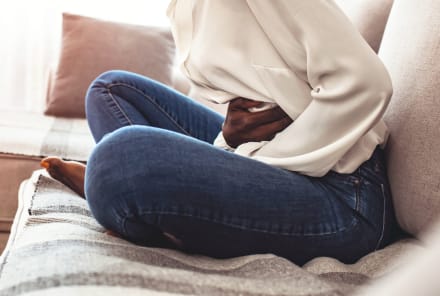Advertisement
6 Things Every Woman Should Know About Hormone Health, From An OB-GYN

Navigating hormone health can feel like solving a mystery, especially when the medical world hasn’t always prioritized studying women’s bodies. But thanks to experts like Kiarra King, M.D., a board-certified obstetrician-gynecologist and sought-after media expert in the women’s health and wellness space, we’re starting to gain more knowledge about women’s health.
In the recent mindbodygreen podcast, King breaks down everything you should know about your hormones—whether you’re thinking about fertility, dealing with PMS, or preparing for menopause. Our recent conversation explores what’s really going on with your body and how you can become your own health advocate.
The medical world has a lot of catching up to do
It’s no secret: the medical establishment hasn’t always been great at studying women’s hormones. For way too long, research focused primarily on men, leaving us with a huge gap in understanding how women’s hormones work. Yet, we know hormones affect nearly every aspect of our lives—mood, skin, energy, and so much more. So why have they been overlooked for so long?
King believes it’s time to change that narrative. She stresses the importance of getting better data about how women’s hormones change throughout different life stages—whether that’s puberty, pregnancy, or menopause. And the key takeaway: the earlier you learn about how hormones affect your body, the more empowered you’ll be to navigate these changes when they come.
Life transitions are totally normal (but they’re not always easy)
Every woman’s hormones fluctuate, and the changes you go through from your 20s to your 50s and beyond are natural. But without enough information, it can feel confusing to figure out what’s normal and what’s not. King says women often feel lost, thinking, "Is this supposed to be happening?" But it’s all about education—and the sooner you get clued in, the better.
Take periods, for example. You might assume your cycle should be the same every month, but in reality, it can vary, and that’s okay! However, if something feels way off, like abnormally heavy bleeding or unbearable cramps, that’s when you should check in with your doctor. Understanding your own baseline and learning to spot what’s normal for you is key to managing these changes.
Educate yourself and advocate for yourself
One of King’s mantras is “education is empowerment.” She believes that the more you know about your hormones, the better you can advocate for your own health. Yet, how many times have you been at a doctor’s appointment and felt embarrassed to ask questions? Or, maybe you’ve even apologized for bringing something up.
King’s advice? Stop apologizing and start speaking up! "You have a voice, use it. This is your body, and you get one life," she says. Whether it’s about your period, birth control, or menopause, asking questions is your right. Preparing a list of questions before your appointment and bringing a friend for moral support can go a long way. King also emphasizes the importance of finding a doctor you trust—someone who listens and makes you feel heard. And if you don’t feel like your doctor is the best fit for you? It’s totally okay to find someone else. Building a solid relationship with your healthcare provider should feel like a team effort.
What’s normal vs. what’s not—and how to know the difference
Many women have been there, wondering, “Is this normal?” regarding hormone changes. King explains that it's not just about lab results—it’s about how you feel. Whether you’re dealing with heavy periods, PMS, or hot flashes, it’s essential to recognize what’s typical for your body and what might need some extra attention.
When it comes to menopause, King defines it simply: one year without a period, usually around age 51. You don’t need a lab test to tell you if you’re in menopause—your symptoms and age will give you the answers. And don’t be afraid to talk to the women in your family about their experience with menopause—it can give you valuable insight into your own timeline!
Fertility: The biological clock is real (but don’t worry!)
We’ve all heard about the biological clock, but King explains the science behind it. Women are born with all the eggs they will ever have, and over time, both the quantity and quality of those eggs start to decline. But here’s the good news: there are tons of options out there if you’re thinking about having kids down the line.
King stresses the importance of realistic conversations around fertility. If you’ve been trying to conceive for over a year (or six months if you’re over 35) without success, it might be time to see a fertility specialist. And don’t forget—men account for about 30% of fertility issues, so they should be tested, too. It’s not just a “woman’s problem.” Whether it’s egg freezing, IVF, or sperm donation, there are so many options for couples who need a little help conceiving. And again, it all comes down to education—knowing your options helps you make informed decisions.
Wearables and hormones
If you’re obsessed with your fitness tracker or sleep app, good news: you can track your hormone health, too. From basal body temperature tracking to period apps, technology is making it easier than ever to stay informed about what’s going on in your body. And in the future? King predicts that wearables might even be able to sync with lab data to give us an even clearer picture of our hormonal health.
But for now, using these tools to monitor symptoms can help you stay on top of your hormone health, whether you’re tracking your period or navigating menopause. Plus, the data can be helpful when you’re talking with your doctor about how you’re feeling—and what you can do to feel even better.
The takeaway
At the end of the day, education is everything when it comes to your hormone health. The more you know, the better you can navigate everything from birth control to menopause. King’s message is clear: advocate for yourself, ask the hard questions, and never be afraid to speak up. You’ve got one body and one life—so make it count!
For a deeper dive into women's hormone health, life transitions, and Kiarra King, M.D.'s expert insights, check out the full episode. You can listen on Apple Podcasts or watch it on YouTube.
*These statements have not been evaluated by the Food and Drug Administration. This product is not intended to diagnose, treat, cure, or prevent any disease.
Watch Next
Enjoy some of our favorite clips from classes
Enjoy some of our favorite clips from classes
What Is Meditation?
Mindfulness/Spirituality | Light Watkins
Box Breathing
Mindfulness/Spirituality | Gwen Dittmar
What Breathwork Can Address
Mindfulness/Spirituality | Gwen Dittmar
The 8 Limbs of Yoga - What is Asana?
Yoga | Caley Alyssa
Two Standing Postures to Open Up Tight Hips
Yoga | Caley Alyssa
How Plants Can Optimize Athletic Performance
Nutrition | Rich Roll
What to Eat Before a Workout
Nutrition | Rich Roll
How Ayurveda Helps Us Navigate Modern Life
Nutrition | Sahara Rose
Messages About Love & Relationships
Love & Relationships | Esther Perel
Love Languages
Love & Relationships | Esther Perel
What Is Meditation?
Box Breathing
What Breathwork Can Address
The 8 Limbs of Yoga - What is Asana?
Two Standing Postures to Open Up Tight Hips
How Plants Can Optimize Athletic Performance
What to Eat Before a Workout
How Ayurveda Helps Us Navigate Modern Life
Messages About Love & Relationships
Love Languages
Advertisement

Yes, There's A Longevity Vitamin (& People Over 40 Need To Prioritize It)
Molly Knudsen, M.S., RDN

Study Investigates How Fasting Impacts Sleep, Hormone Health & More
Gretchen Lidicker, M.S.

Yes, There's A Longevity Vitamin (& People Over 40 Need To Prioritize It)
Molly Knudsen, M.S., RDN

Study Investigates How Fasting Impacts Sleep, Hormone Health & More
Gretchen Lidicker, M.S.

Yes, There's A Longevity Vitamin (& People Over 40 Need To Prioritize It)
Molly Knudsen, M.S., RDN

Study Investigates How Fasting Impacts Sleep, Hormone Health & More
Gretchen Lidicker, M.S.

Yes, There's A Longevity Vitamin (& People Over 40 Need To Prioritize It)
Molly Knudsen, M.S., RDN

Study Investigates How Fasting Impacts Sleep, Hormone Health & More
Gretchen Lidicker, M.S.














